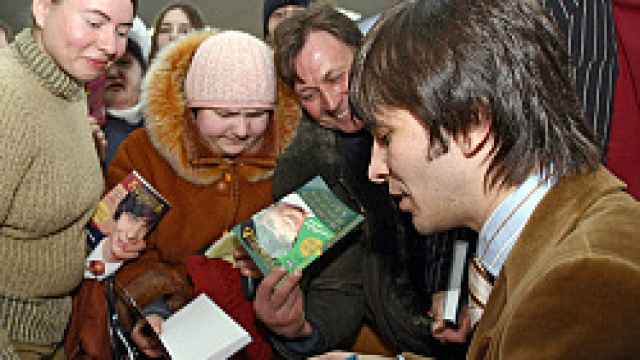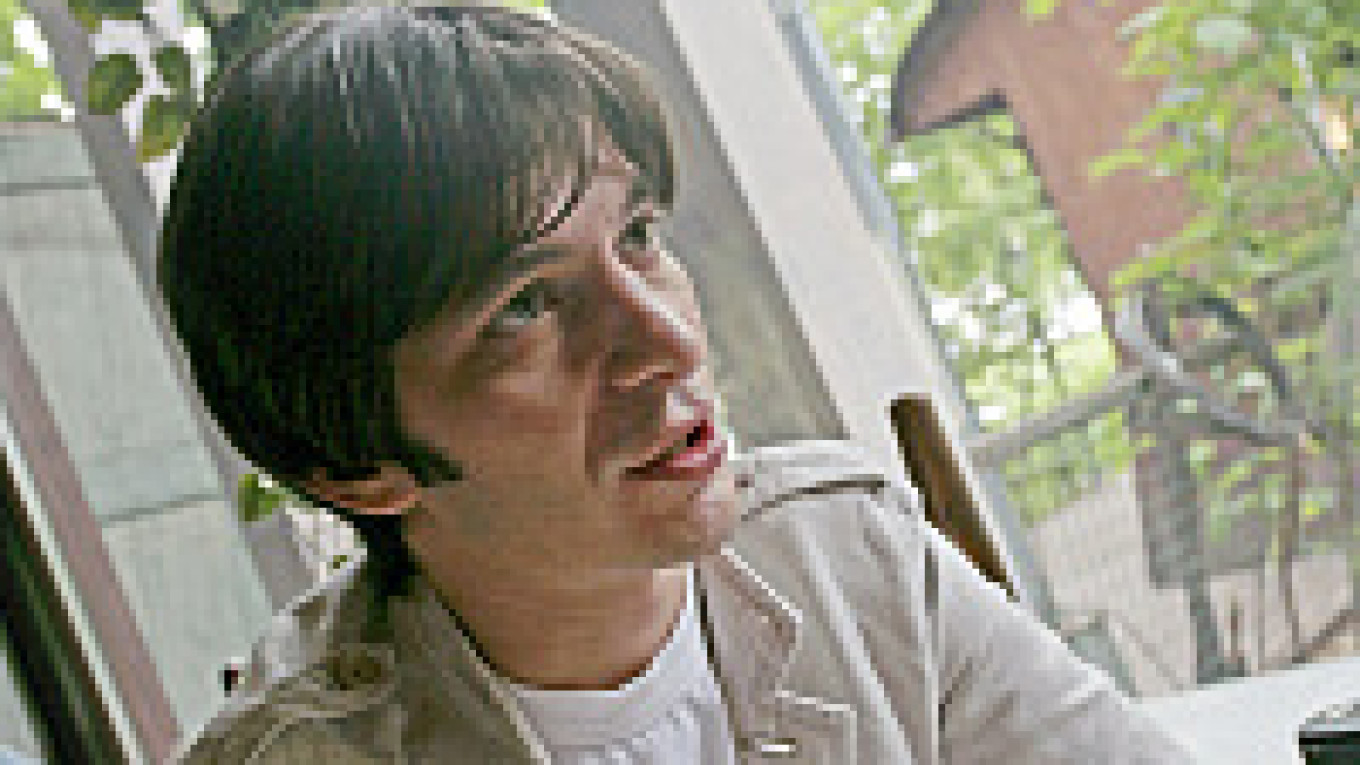The original version of his show, called "There are No Problems With Doctor Kurpatov," premiered on the newly launched Domashny channel in May 2005. Airing seven days a week, in both the afternoons and evenings, the? show soon? made Kurpatov a familiar face on Domashny, which is received by about half of the Russian population.
In a simple format, a member of the public (usually a woman) sat in a softly lit room with Kurpatov and discussed a long-term, but not hugely serious, psychological problem. Insomnia, fear of blood, lack of self-esteem and problems holding down relationships were all tackled. At the end of the 42-minute show, the guest explained to viewers how Kurpatov had helped him or her to move on.
When the show was relaunched on Channel One on May 29, it was renamed "Doctor Kurpatov" and scheduled for every weekday afternoon. Last week, the show's eponymous host sat in a cafe near the Ostankino television center, where he was preparing to film a block of 20 episodes. Wearing a white jacket and jeans, he looked more youthful than on the show, where he wears a suit and has stiffly styled hair.
"Being on Channel One is a chance to talk to every single person," Kurpatov said of the show's move. The daytime scheduling bothered him, he admitted, hinting that he'd like to expand his reach with a prime-time slot. "I'm not contenting myself with that. It's important to me to do the show, and I think that the channel is also interested in making the thoughts, positions and views that we voice available to a large number of viewers."
Besides hosting the show, Kurpatov has written about 30 books. Featuring his face on the cover, they are prominently displayed in the psychology sections of many Russian bookstores. His success has come despite the fact that psychotherapy is relatively new in Russia, having been virtually nonexistent during the Soviet era.
Several mental-health professionals, however, were critical of Kurpatov's approach when contacted for comment. Viktoria Potapova, president of the Moscow Society of Psychoanalysts, said by telephone last weekend that professionals were glad to see the public's booming interest in psychology. But she dubbed Kurpatov's show a symptom of consumer society, in which people want quick and easy solutions: "You get on television and everything works out in your life."
Potapova said that she had watched snippets of the show after hearing comments from her patients, and didn't like what she saw. "You can't fully understand a person in the course of an hour," she said, recalling how one female guest repeatedly told Kurpatov, "You're not listening to me."
Other experts said they had not watched the show. "I barely watch television," said Valery Krasnov, head of the Psychiatric Scientific Research Institute of the Russian Academy of Medical Sciences, in a recent telephone interview. He added, however, that "in our circle, I've heard many critical comments."
Responding to his critics, Kurpatov said, "In any community, there are -- how can I put it? -- people who really understand what's important, and people who don't. The people who don't understand are the ones who take a negative view."
The aim of the show is to give psychotherapy a public face, he said. "My task now is popularizing psychotherapy, generally explaining what it is and why people might go to a psychotherapist." And many professionals support him, he said. "I know there are huge numbers of specialists who understand how necessary it is simply to begin talking about psychological problems."
Kurpatov emphasized that the sessions on his show "are not psychotherapy." He does not consult with the guests after the show ends. Still, he said, "The television sessions are highly effective for the simple reason that a person who has made the decision to solve their problem in front of so many viewers is very strongly motivated to change."
 Itar-Tass Kurpatov signs books for fans in Samara last winter. He has written close to 30 books so far. | |
Kurpatov appeared on the cover of Hello! in January, just as his original show on Domashny ended. At the time, many press reports linked the closure to a lawsuit from Ramil Garifullin, a psychologist from Kazan who claimed that he had invented the format and that it had been stolen by the show's one-time producer, Andrei Razbash. However, Kurpatov dismissed these charges.
"I don't have a format -- the format is me," he said. "I worked for three years on this program before it was broadcast, and out of those I worked for three months with Andrei Razbash." The lawsuit was withdrawn by Garifullin when Domashny stopped broadcasting the show, he added.
Kurpatov also gave another reason for the end of the Domashny show. "We couldn't physically continue producing the show in such a format, in such circumstances. How could we? Four people were making a daily show."
The Domashny show was filmed in an apartment. Thanks to a bigger budget, the Channel One show has an updated set at Ostankino with leather armchairs and a screen showing Michelangelo's "Creation of Adam," perhaps implying that Kurpatov has a similar effect on his guests.
A few hours earlier on Channel One, viewers can watch a show called "Malakhov +" that is hosted by a proponent of folk medicine, Gennady Malakhov, whose books include one about how to treat and prevent cancer using traditional methods. The show's format involves a guest with a health problem who is advised by Malakhov and other alternative healers, although a medical doctor also gives advice.
Kurpatov said that he offered an "alternative" to Malakhov's solutions, but he was diplomatic about his channel-mate. Unlike professional doctors in Russia, Malakhov gives an explanation, he said. "Since when has a general practitioner told a patient that he is suffering from high blood pressure, and that happens for such-and-such a reason? ... He will say, 'Take these pills,' and show him the door."
Kurpatov comes from a family of army doctors, and his father heads the psychotherapy department at St. Petersburg's Academy of Postgraduate Medical Studies, where the television host also studied. Like his father, he believes that behavioral psychotherapy should include medical treatment. "We believe that in Russia, at least at the present stage, psychotherapy should be medical, because our citizens need not only high-quality advice and recommendations, but also simple help with their mental state, which has been greatly undermined over the last 15 years."
At the moment, free psychotherapy is not generally available in Russian polyclinics, he said. Psychotherapists work in specialized psychiatric clinics. Most cities also have emergency help lines, which refer callers to psychotherapists who will give free consultations.
Currently, Kurpatov is not a practicing psychotherapist. His private clinic in St. Petersburg is staffed by doctors whom he trained.
The topics of Kurpatov's books range from depression to sleeping problems. Recently, he recalled, a woman from a provincial city approached him at a party and told him that "How Can You Survive Divorce?" was his most popular book. Published this year, it is aimed solely at women, a fact that Kurpatov attributes to the fact that men usually initiate divorce.
The pocket-sized book quotes women in group-therapy sessions and has plenty of cross-references to Kurpatov's other works. "I write about the difference between male and female psychology in the book 'Beauty and the Beast,' and about the difference between male and female sexuality in the book 'The Secrets of Adam and Eve,'" one footnote reads.
More books are on the way, Kurpatov said, explaining that he planned to write about all of the problems he considered important. "I've already written two-thirds of them, I think."
"Doctor Kurpatov" airs Mon. through Fri. at 4:20 p.m. on Channel One.
A Message from The Moscow Times:
Dear readers,
We are facing unprecedented challenges. Russia's Prosecutor General's Office has designated The Moscow Times as an "undesirable" organization, criminalizing our work and putting our staff at risk of prosecution. This follows our earlier unjust labeling as a "foreign agent."
These actions are direct attempts to silence independent journalism in Russia. The authorities claim our work "discredits the decisions of the Russian leadership." We see things differently: we strive to provide accurate, unbiased reporting on Russia.
We, the journalists of The Moscow Times, refuse to be silenced. But to continue our work, we need your help.
Your support, no matter how small, makes a world of difference. If you can, please support us monthly starting from just $2. It's quick to set up, and every contribution makes a significant impact.
By supporting The Moscow Times, you're defending open, independent journalism in the face of repression. Thank you for standing with us.
Remind me later.


